A December 27 judgement of the Gujarat high court upholding the Gujarat Self-Financed Schools (Regulation of Fees) Act, 2017 which prescribes absurdly low fees ceilings for all primary, secondary and higher secondary schools, has come as a thunderclap for private independent schools countrywide - Dilip Thakore
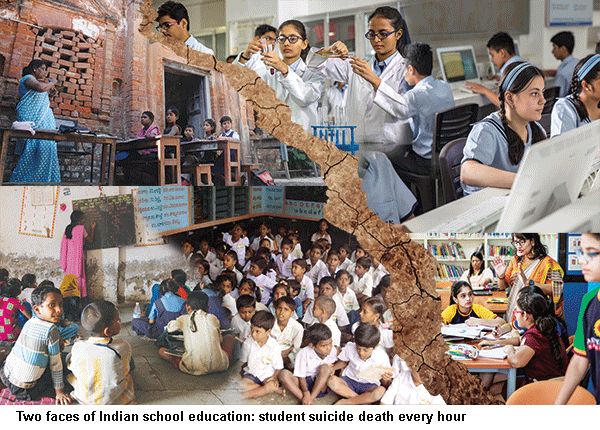 For the more clued-up among the managements of India’s 320,000 private schools struggling to bridge the widening gap in K-12 education between India and not only the developed industrial countries of the West, but also with neighbouring China and the emergent countries of South-east Asia, new year celebrations were surely clouded.
For the more clued-up among the managements of India’s 320,000 private schools struggling to bridge the widening gap in K-12 education between India and not only the developed industrial countries of the West, but also with neighbouring China and the emergent countries of South-east Asia, new year celebrations were surely clouded.
On December 27, a two-judge bench of the Gujarat high court upheld the Gujarat Self-Financed Schools (Regulation of Fees) Act, 2017, passed by the state legislative assembly in March last year. The Act prescribes upper fees limits of Rs.15,000, Rs.25,000 and Rs.27,000 per year for private primary, secondary and higher secondary schools in the state. Rejecting around 40 petitions which challenged the constitutional validity of the Act, a division bench of the high court (Chief Justice R. Subhash Reddy and Justice V.M. Pancholi) ruled that the state legislature is entitled to regulate the tuition and other fees of not only schools affiliated with the state board, but also of schools affiliated with the pan-India Central Board of Secondary Education (CBSE) and Council for Indian School Certificate Examinations, both based in Delhi. For the past 70 years since independence, schools affiliated with these national exam boards — and the small number affiliated with offshore exam boards such as Cambridge Assessment International Education (formerly CIE), UK, International Baccalaureate, Geneva, and Edexcel, UK — have been accepted as being beyond the administrative purview of state governments.
Essentially, counsel for the petitioners argued that to set common tuition fee ceilings for all primary, secondary and higher secondary schools, which have invested varying amounts in infrastructure, teacher training, teacher-pupil ratios, sports and games facilities, is violative of Article 14 of the Constitution which guarantees all citizens (i.e, promoters of private schools) equality before the law. Indeed legal eagle and former Union minister Kapil Sibal who argued the petitioners’ appeal in the Supreme Court which was admitted on January 15 and listed for February 1, contended that the per student expenditure incurred by the Central government in its 1,140 Kendriya Vidyalaya schools is Rs.98,000 per year and therefore the tuition fees of Rs.15,000 for primary, Rs.25,000 for secondary and Rs.27,000 for higher secondary schools in Gujarat were ex facie absurd and violative of Article 14.
In the Gujarat high court petitioners’ counsel argued that in the landmark T.M.A. Pai Foundation Case (2002), the majority of a full bench (11 judges) of the apex court had held that unaided or self-financed institutes of professional education are entitled to charge reasonable tuition fees and earn a surplus for the expansion and maintenance of their institutions. And in the matter of tuition fees, a seven-judge bench in P.A. Inamdar vs. State of Maharashtra (2005) was unequivocal. “Fees to be charged by unaided institutions cannot be regulated but no institution should charge capitation fee,” opined the unanimous judgement of the court. Although this judgement pertained to private unaided colleges of professional education, its rationale also applies to private unaided schools, argued counsel for the petitioners who contested the constitutional validity and vires of the Gujarat Self-Financed Schools legislation.
Nevertheless the judges set great store on the fact that s.3 of the Act provides for aggrieved schools to appeal to one of the four zonal fees regulation committees headed by retired district or sessions court judges and show cause why they should be allowed to charge more than the stipulated ceiling fees. Moreover s.12 allows further appeal to a revision committee headed by a retired high court judge. Therefore the high court bench held that the impugned provisions of the Gujarat Self-Financed Schools (Regulation of Fees) Act, 2017 and its Rules “are not violative of Article 14 and Article 19 (1) (g) of the Constitution of India and the various restrictions in the above said provisions of the Act and rules framed thereunder are reasonable restrictions, within the meaning of Article 19 (6) of the Constitution of India”.
The high court’s verdict upholding the state government’s ex facie absurd school fees ceilings has aroused widespread indignation mixed with apprehension within the community of private school promoters and managements, not only in Gujarat but across the country. Since under India’s legal system, a high court judgement becomes law of the land, within India’s 320,000 private schools which host almost half the children in K-12 education, there is rising disquiet that this judgement is a licence for state governments to play an increasingly larger role in the administration of private schools, particularly in determining tuition fees levied by them. The Gujarat high court’s December 27 judgement has come as a thunderclap especially for managements of the country’s Top 1,000 primary-secondaries (rated and ranked in several categories and across a dozen parameters of education excellence every September by EducationWorld), which are struggling to catch up with the high standards of public school education in the West and China, widely perceived to be preparing better educated school-leavers than even India’s top-ranked private schools. In the emerging highly competitive global market for goods and services, that’s bad news for Indian educators — and should be for this country’s Central and state governments, and laid-back intelligentsia and academia.
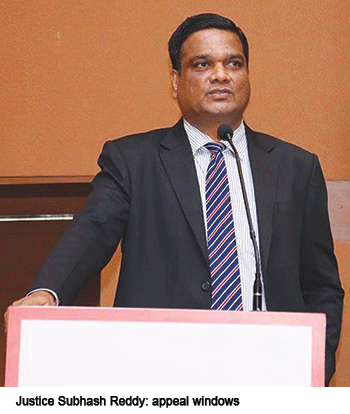 The Gujarat high court’s December 27 judgement defies all logic and is a huge setback for private school education in India, and especially in Gujarat. Over 70 associations of private schools in the state have appealed to the Supreme Court against this judgement. The main grounds of appeal are definition of autonomy of private unaided schools established by charitable trusts, societies and s.25 of the Companies Act, denial of equality under Article 14 and the applicability of the Supreme Court’s judgements in the T.M.A Pai Foundation and P.A. Indamdar cases to K-12 education. In my opinion, judgements of full benches of the Supreme Court which allowed all citizens to pursue the occupation of providing education to the public and earn reasonable surpluses of 10-15 percent for investment in institutional development, are the definitive judgements on this issue. I believe that the high court judges have made a very narrow interpretation of what is education in the 21st century. Contemporary education includes co-curricular and sports education which requires heavy investment in well-trained teachers, manageable teacher-pupil ratios and infrastructure. These facilities cannot be provided
The Gujarat high court’s December 27 judgement defies all logic and is a huge setback for private school education in India, and especially in Gujarat. Over 70 associations of private schools in the state have appealed to the Supreme Court against this judgement. The main grounds of appeal are definition of autonomy of private unaided schools established by charitable trusts, societies and s.25 of the Companies Act, denial of equality under Article 14 and the applicability of the Supreme Court’s judgements in the T.M.A Pai Foundation and P.A. Indamdar cases to K-12 education. In my opinion, judgements of full benches of the Supreme Court which allowed all citizens to pursue the occupation of providing education to the public and earn reasonable surpluses of 10-15 percent for investment in institutional development, are the definitive judgements on this issue. I believe that the high court judges have made a very narrow interpretation of what is education in the 21st century. Contemporary education includes co-curricular and sports education which requires heavy investment in well-trained teachers, manageable teacher-pupil ratios and infrastructure. These facilities cannot be provided 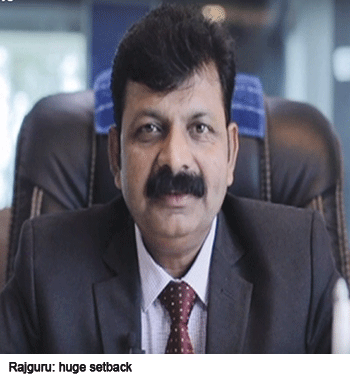 within the fee ceilings prescribed by the Gujarat Self-Financed Schools Act,” says Dipak Rajguru, president of the Federation of Self-financed Schools Managements Association, Gujarat, the lead petitioner in the appeal pending hearing in the Supreme Court.
within the fee ceilings prescribed by the Gujarat Self-Financed Schools Act,” says Dipak Rajguru, president of the Federation of Self-financed Schools Managements Association, Gujarat, the lead petitioner in the appeal pending hearing in the Supreme Court.
In their December 27 judgement the learned judges gave considerable weightage to s.3 and s.12 under which the state government has established four zonal fee regulation committees (FRCs) headed by retired district or sessions judges or senior government officials to whom aggrieved schools can make their cases for allowing higher tuition and other fees and provides for appeal to a Fee Revision Committee. But promoters of high-end schools affiliated with national and international exam boards — all of whom were mortified about going on record, perhaps the outcome of 15 years of uninterrupted BJP rule in the state — are dismissive of these five-member (chartered accountant, civil engineer, academician of repute and a representative of self-financed schools) committees comprising all government nominees.
“These fee ceilings have been prescribed by myopic, populist politicians to win public votes and support. The stipulated maximum fees are markers for the FRCs whose unemployed members are entirely appointed by the state government. They are old fossils who will keep recalling the rock-bottom school fees their parents used to pay for their education. Which FRC will accept that modern international schools need to charge eight-ten times the fees prescribed by the Act? These committees will force private schools to cut expenditure on music, drama, dance and sports education and reduce them to the condition of government schools. They are just an eyewash which will tie up managements of unaided schools in reams of red tape and corruption. We are very clear that we want the autonomy and right to self-administration conferred upon private professional education institutions by the T.M.A Pai Foundation and P.A. Indamdar cases to be extended to private unaided schools. We are fighting for freedom and the right to provide high quality education,” says the irate promoter of a high-end K-12 school affiliated with CISCE and an offshore exam board.
However it is pertinent to note that if the regulation of private unaided schools in Gujarat has become a burning issue nationwide, it’s because pressure for government regulation (reduction) is being exerted by their own parent bodies comprising post-independence India’s subsidies-addicted middle class. Disregarding the mountain of evidence of mismanagement, teacher absenteeism and rock-bottom learning outcomes in the country’s 1.4 million dysfunctional government schools which is prompting children from even the poorest households to flee from them, and also from higher education (heavily regulated by government), short-sighted parents are welcoming government intervention in private schools by way of tuition fees regulation.
|
Gujarat Self-Financed Schools (Regulation of Fees) Act, 2017: Major provisions
|
|
S.2 (g). Fee or fee structure includes tuition fee, term fee, which shall not exceed one month tuition fee per term; library fee and deposit; lab fee and deposit; gymkhana fee; caution money; examination fee; admission fee, which shall not exceed one month tuition fee; yoga and physical education fee, and any other fee determined by the Fee Regulatory Committee.
S.2 (u). Self financed school. Any pre-primary to higher secondary school not receiving financial grant or assistance from the Central government or the state government or any local authority.
S.3 (1). The government shall constitute a Fee Regulation Committee for the purpose of determination of the fee for any standard or course of study in self financed schools.
S.3 (4). The committee shall consist of a retired district and sessions judge or a person who had been a member of All India Service, having retired from a post not below the rank of principal secretary to government or a person who had been a member of India Police Service, having retired from a post not below the rank of additional director general of police, to be nominated by the government, who shall be the chairperson of the committee; a chartered accountant, to be nominated by the government; one civil engineer/government approved valuer, to be nominated by the government; one representative from the self financed school management of the respective zone, to be nominated by the government; one academician of repute, to be nominated by the government.
S.4 (1). The jurisdiction of each Fee Regulatory Committee shall be the zone comprising such districts as the state government may, by notification in the Official Gazette, specify.
S.8 (1). Subject to the provisions of s.9 (exempting schools charging less than the prescribed ceiling fees) the Fee Regulatory Committee shall determine the fee payable by students in self financed schools.
S.8 (2). The Committee shall have power to inspect relevant documents and books of accounts of applicant schools; hear complaints or initiate suo motu hearing with regard to collection of excess fee by a self financed school; regulate the fees charged by the school and penal action as per the provisions of this Act; and shall have the powers of a civil court under the Code of Civil Procedure, 1908.
S.10 (1). The Fee Regulatory Committee shall determine the fee leviable by a self financed school taking into account location i.e, village, town, or city; investment incurred to set up the school; infrastructure available to the students; expenditure on administration, maintenance of services and utilities of the school; students strength in the self financed school; classes of study and courses of study offered by the school; qualification of teaching and non-teaching staff (as per the relevant norms), their salary components, and reasonable amount for yearly salary increments; expenditure incurred on the students against total income of the school which shall include profit earned from the school by the trust or company associated with such school; reasonable revenue surplus for the purpose of development, education and expansion of the school.
S.11 (1). No self financed school shall collect any fee in excess of the fee fixed by the Fee Regulatory Committee.
S.12 (1). The government shall constitute a committee for the purpose of revision against the order passed by the Fee Regulatory Committee(s).
S.12 (2). The committee shall consist of a retired judge of the high court, nominated by the government as chairperson of the committee; secretary to the government of Gujarat, education department (primary and secondary); secretary, finance department, government of Gujarat, or his nominee; secretary, Gujarat secondary and higher secondary education board or, as the case may be, the director, primary education, ex-officio; one representative from the self financed school management to be nominated by the government; a chartered accountant to be nominated by the government.
S.12 (4). The orders passed by the Fee Revision Committee shall be final and binding on the self financed school.
S.13 (1). The government shall regulate the maintenance of accounts by the self financed school in such manner as may be prescribed.
S.14 (1). For contravention of any of the provisions of this Act or the rules made thereunder, the school management shall refund twice the amount of fee to the parents or guardians or to the person who has made the payment, and to pay fine which shall be upto five lakh rupees to the FRC for the first contravention; pay fine not less than five lakh rupees but which may extend to ten lakh rupees for the second contravention; and for cancellation or withdrawal of registration/affiliation/No Objection Certificate of the school.
S.15. No Civil Court shall have the jurisdiction to deal with or decide any question which the FRC or Fee Revision Committee is empowered to deal with.
|
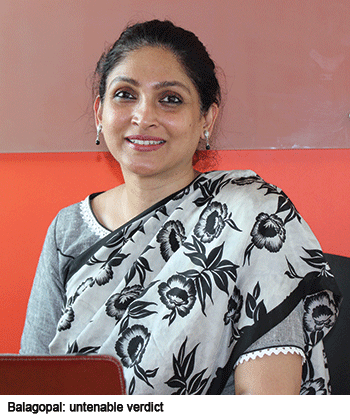 But for the situation to have reached this sorry pass, parents communities are not entirely to blame. Their right for information and financial transparency from schools clashes against the right of schools to decide fees based on their right to administer themselves according to their educational priorities, says Divya Balagopal, an alumna of the National Law School of India University, Bangalore, and the Institute of Graduate Studies, Geneva, and former consultant with Unicef, who co-founded Mundkur Law Partners, Bangalore (estb. 2007) a firm which provides legal advice with special focus in the areas of education, life sciences, fintech, mergers and acquisitions. “At the time when parents come to a private school for admission of their children into primary classes, they should be given a road map of secondary and higher secondary fees, plus anticipated annual fee increases. This would enable them to plan and make financial provision for the education of their children. Moreover to maintain their independence, it would be advisable for private schools to form associations which would draw up codes of conduct and best practices for all member schools to follow to safeguard the interests of all stakeholders,” says Balagopal.
But for the situation to have reached this sorry pass, parents communities are not entirely to blame. Their right for information and financial transparency from schools clashes against the right of schools to decide fees based on their right to administer themselves according to their educational priorities, says Divya Balagopal, an alumna of the National Law School of India University, Bangalore, and the Institute of Graduate Studies, Geneva, and former consultant with Unicef, who co-founded Mundkur Law Partners, Bangalore (estb. 2007) a firm which provides legal advice with special focus in the areas of education, life sciences, fintech, mergers and acquisitions. “At the time when parents come to a private school for admission of their children into primary classes, they should be given a road map of secondary and higher secondary fees, plus anticipated annual fee increases. This would enable them to plan and make financial provision for the education of their children. Moreover to maintain their independence, it would be advisable for private schools to form associations which would draw up codes of conduct and best practices for all member schools to follow to safeguard the interests of all stakeholders,” says Balagopal.
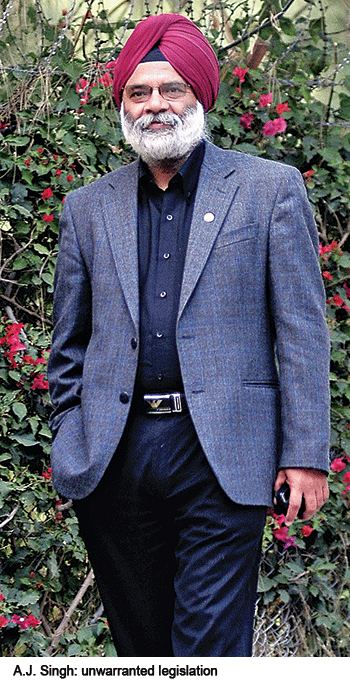 On the issue of the Gujarat high court’s December 27 judgement upholding the arbitrary tuition fee ceilings imposed on all schools statewide regardless of exam board affiliation pending appeal in the Supreme Court, Balagopal is unequivocal. “The premises and conclusions of the high court’s division bench are untenable. I believe that the Supreme Court’s judgements in the T.M.A Pai Foundation Case (2002), which reiterated the right of independent education institutions to self-administer and derive a reasonable surplus — defined as 15 percent by the Income Tax Act — and the P.A. Inamdar’s Case (2005) which explicitly forbids government regulation of tuition fees, is the law of the land. It would also be in the public interest if the apex court would review its previous and somewhat archaic judgements prohibiting commercialisation of education — currently only charitable trusts and societies are permitted to promote education institutions — and also allow for-profit companies subject to tax, to freely engage in education,” says Balagopal.
On the issue of the Gujarat high court’s December 27 judgement upholding the arbitrary tuition fee ceilings imposed on all schools statewide regardless of exam board affiliation pending appeal in the Supreme Court, Balagopal is unequivocal. “The premises and conclusions of the high court’s division bench are untenable. I believe that the Supreme Court’s judgements in the T.M.A Pai Foundation Case (2002), which reiterated the right of independent education institutions to self-administer and derive a reasonable surplus — defined as 15 percent by the Income Tax Act — and the P.A. Inamdar’s Case (2005) which explicitly forbids government regulation of tuition fees, is the law of the land. It would also be in the public interest if the apex court would review its previous and somewhat archaic judgements prohibiting commercialisation of education — currently only charitable trusts and societies are permitted to promote education institutions — and also allow for-profit companies subject to tax, to freely engage in education,” says Balagopal.
Capt. A.J. Singh, executive director and principal of the Pinegrove School, Dharampur, Himachal Pradesh (estb. 1991) routinely ranked among India’s Top 10 co-ed boarding schools in the annual EducationWorld India School Rankings, is equally wary of “inspector raj” which nearly destroyed Indian industry in the pre-liberalisation era. “The Income Tax Act and the Societies Registration Act already have stringent provisions to prevent commercialisation of school education and to ensure that surpluses if any are ploughed back into institution development. The Central and state governments need to focus on proper implementation of existing laws rather than introduce new legislation such as the Gujarat fees regulation legislation which further complicates the education scenario,” says Singh.
This is good advice. It’s important to bear in mind that the rulings of the Supreme Court against “commercialisation of education” were made in the 1970s when India was a stridently socialist country. In that tumultuous decade ‘profit’ was a dirty word and strict licence-permit-quota raj was imposed on industry by prime minister Indira Gandhi, who also brazenly superseded several judges of the Supreme Court to appoint A.N. Ray as Chief Justice of India, who in turn packed the apex court with ‘committed’ (leftist/socialist/communist) judges. Moreover the words ‘socialist’ and ‘secular’ were inserted into the preamble of the Constitution to describe India as the “socialist, secular Republic of India”.
But the second tryst with socialism — after India’s first prime minister Jawaharlal Nehru committed to develop post-independence India according to the “socialist pattern of society” in 1956 — proved even more disastrous, culminating in the first, and as yet only internal Emergency (1975-76), during which over 100 opposition leaders were incarcerated in prison for — over 19 months and censorship was imposed on the media. Subsequently from the 1980s the licence-permit-quota shackles imposed upon industry were gradually relaxed, culminating in the historic Union budget of 1991-92 which substantially abolished licence raj resulting in doubling annual GDP growth ever since. However Indian education remained largely untouched, except for the arrival of new genre international schools in India.
In the new millennium perhaps encouraged by the liberal judgements of the apex court in the T.M.A. Pai Foundation and P.A. Inamdar cases, a new generation of education entrepreneurs (edupreneurs) discerned opportunities to combine idealism with business. But while private school promoters with deep pockets, land banks, political influence and capability to hire the country’s best lawyers were able to get greenfield (including several high-profile international schools) smoothly on stream, promoters of low priced and mid-priced private schools are reporting formidable hurdles in negotiating the multiplying number of government rules, regulations and procedural hurdles placed in their way.
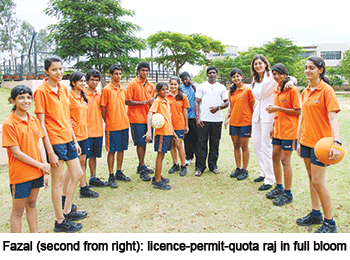 For instance a plethora of licences, permissions and condition precedent documents need to be signed, sealed and delivered by greenfield school promoters to the state government before a primary-secondary school is permitted to admit students in Karnataka. “A greenfield school promoter requires 70-90 permissions from several departments including the women and child welfare, police, transport ministries, Municipal Corporation and department of public instruction. Moreover, if a promoter is very persistent, permission is granted only to start a school in a phased manner. And, once a school is set up, every little fault, perceived or actual, comes with a threat of closure or arrest. Who would want to set up a school with constant fear of harassment and over-monitoring? Managing a school or choosing teaching as a career isn’t the respectable vocation it was,” said Nooraine Fazal, an alumna of Boston University, former Reuters manager in Asia-Pacific and co-founder of the nationally Top 10 ranked Inventure Academy, Bangalore (estb.2005) in an interview with EducationWorld last month (January, p.25).
For instance a plethora of licences, permissions and condition precedent documents need to be signed, sealed and delivered by greenfield school promoters to the state government before a primary-secondary school is permitted to admit students in Karnataka. “A greenfield school promoter requires 70-90 permissions from several departments including the women and child welfare, police, transport ministries, Municipal Corporation and department of public instruction. Moreover, if a promoter is very persistent, permission is granted only to start a school in a phased manner. And, once a school is set up, every little fault, perceived or actual, comes with a threat of closure or arrest. Who would want to set up a school with constant fear of harassment and over-monitoring? Managing a school or choosing teaching as a career isn’t the respectable vocation it was,” said Nooraine Fazal, an alumna of Boston University, former Reuters manager in Asia-Pacific and co-founder of the nationally Top 10 ranked Inventure Academy, Bangalore (estb.2005) in an interview with EducationWorld last month (January, p.25).
Moreover, instead of focusing on improving learning outcomes in its own 81,346 government schools, under pressure from sub-nationalist champions of Kannada, the state’s dominant vernacular language, successive governments banned English as the medium of instruction in all greenfield primary schools for over two decades (1994-2014), and discouraged teaching this link language of India and global language of business even as a second language. While in private schools this ban was practiced more in the breach than observance with the state government’s notoriously venal school inspectors ready to turn a blind eye to this injunction, until the Supreme Court overturned this government ordinance in State of Karnataka vs. Associated Managements of Government Recognised Unaided English Medium Primary & Secondary Schools (2014), the ‘supply’ of new English medium primary-secondaries was substantially restricted with the result that the demand for admissions in mid-market, especially vintage convent and missionary schools far outstrips supply.
The consequence is that securing admission in them for children of desperate middle class parents has emerged as a lucrative business for a small number of consultants, brokers and fixers, and scandalous stories of principals, church managements and even bishops demanding huge bribes for admissions, are common bazaar gossip. And this scenario is true of all major metros and large cities across the country. Indeed it’s now well-established that the favour of unmerited admission(s) into mid-market English-medium schools or a scholarship from a high-end international school, is an inducement to which even the most honest and upright politicians and bureaucrats are susceptible.
Now with state governments countrywide hell-bent upon regulating the tuition and other fees charged by private schools even as the supply of greenfield private schools is being choked by the bureaucracy, the emergence of a grey market and phenomenon of ‘capitation fees’ — under the table upfront lump sum payments — expressly prohibited and censured by every Supreme Court judgement, is likely to become an admission season reality. Perhaps even for bottom-of-the-pyramid households because simultaneously, private budget schools — the refuge of children fleeing from dysfunctional government schools — are being forcibly shut down across the country.
Under s. 19 of the Right of Children to Free and Compulsory Education Act, 2009, private schools are obliged to comply with infrastructure and other norms specified in the Schedule of the Act. These norms include an all-weather building, separate toilets for boys and girls, differing teacher-pupil ratios from classes I-V, and V-VII, provision of safe drinking water, kitchen and a playground. These specified norms (which curiously don’t apply to government schools) have hit the country’s private budget schools (PBS) — typically, cramped, low-fee primaries with minimal infrastructure in slum habitations, many of which are ‘unrecognised’ and whose number is estimated at a massive 450,000 by the Centre for Civil Society, a Delhi-based think tank — particularly hard as s.19 prescribes heavy financial penalties including forcible closure of non-compliant PBS.
Gujarat high court judgement conclusions
|
|
(A) The respondent state has legislative competence to enact the Gujarat Self-Financed Schools (Regulation of Fees) Act, 2017 and the Rules framed thereunder, including for the schools affiliated to CBSE, CISCE and IB and the provisions of said Act and Rules framed thereunder are also not repugnant to the Right of Children to Free and Compulsory Education Act, 2009.
(B) Sections 2 (g), 2 (r), 2 (t), 2 (u), 3, 8, 9, 10, 11 and 12 of the Gujarat Self-Financed Schools (Regulation of Fees) Act, 2017 and the Rules 6, 7 and 8 and Form II and its Annexures of the Gujarat Self-Financed Schools (Regulation of Fees) Rules, 2017 are not violative of Article 14 and 19 (1) (g) of the Constitution of India and the various restrictions in the above said provisions of the Act and Rules framed thereunder are reasonable restrictions, within the meaning of Article 19 (6) of the Constitution of India.
(C) The provisions of the Gujarat Self Financed Schools (Regulation of Fees) Act, 2017 and the Rules framed thereunder are not violative of the rights guaranteed under Article 30 of the Constitution of India with regard to the minority institutions.
(D) Constitution of Fee Regulatory Committee, and Fee Revision Committee under s.3 and s.12 of the Gujarat Self Financed Schools (Regulation of Fees) Act, 2017 are not unconstitutional, as contended by the petitioners.
(G) We further make it clear that it is open to the Self Financed Schools which are required to submit proposal in Form II to the Fee Regulatory Committee for fixation of fees to propose fees not restricting to various types of fees notified under s. 2 (g). It is further open for such schools to propose any other fees to improve the quality of education and standard of schools. At the same time, such proposal should not amount to charging of exorbitant fees, or profiteering within the meaning of s. 2 (r) of the Act.
|
The closure of an estimated 2,900 PBS across the country and closure notices served to 15,600, has exerted additional admissions pressure on low-priced and mid-market private schools. Instead of encouraging idealistic PBS promoters and principals who are fulfilling a public need, state governments are forcing them to close down their schools and in turn pushing children from poorest households back into dysfunctional government schools with crumbling infrastructure, chronic teacher absenteeism, English teaching aversion and pathetic learning outcomes. Little wonder that of the 250 million children enrolled in primary schools every academic year, a mere 127 million complete secondary school. The logical option of providing soft loans and tax breaks to PBS promoters who are ideally positioned to fill the demand-supply gap for low-priced private schools has not yet appeared on the radar of the Central and state governments.
The cumulative impact of the migration of the licence-permit-quota regimen from industry into education which has culminated in the Delhi and Gujarat state governments imposing tuition fee ceilings on all schools regardless of exam board affiliation — and several state governments are set to follow their example — is that investment in K-12 education, which ha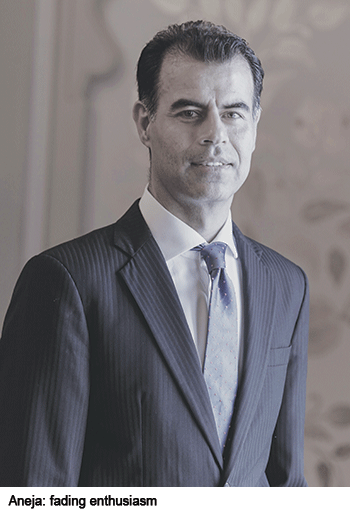 d aroused great enthusiasm in the early years of the new millennium, is losing its shine despite India hosting the world’s largest and eager-to-learn child population.
d aroused great enthusiasm in the early years of the new millennium, is losing its shine despite India hosting the world’s largest and eager-to-learn child population.
In recent years foreign and domestic investors have become less enthusiastic about investing in greenfield schools and education goods and services companies in India. Even high end schools are reducing their expenditure on infrastructure and innovation because they are finding it hard to make ends meet as fee rises haven’t kept pace with inflation. Moreover onerous fee cap and other regulations and increasing government interference in the administration of private schools is putting off even idealistic investors from entering the education sector. Consequently investors, including private equity funds, are investing in preschools and K-12 education in more liberal countries such as Thailand and Vietnam. Incremental government interference in the affairs of independent schools is ill-advised and will result in levelling down of learning outcomes and corruption,” warns Sandeep Aneja, a civil engineering postgrad with an MBA from Stanford University and promoter director of Kaizen Manager Partners Ltd, India’s sole education focused private equity fund which has assets valued at $150 million under management.
| Relevant constitutional provisions & case law |
|
Article (14). The law shall not deny to any person equality before the law or the equal protection of the laws within the territory of India.
Article 19 (1) (g). All citizens have the right to practise any profession, or to carry on any occupation, trade or business.
Article 19 (6). Nothing in sub-clause (g)… prevents the State from making any law imposing reasonable restrictions in the interests of the general public on the exercise of the rights conferred by the said sub-clause.
Article 30 (1). All minorities, whether based on religion or language, shall have the right to establish and administer educational institutions of their choice.
T.M.A. Pai Foundation & Ors vs. Union of India (2002). The majority of an 11-judge bench of the Supreme Court upheld the right of minorities to establish and self-administer education institutions of their choice under Article 30 (1) of the Constitution and expanded this right to all citizens, provided admissions are transparent and based on merit. Moreover, it held that all citizens of India have a fundamental right under Article 19 (1) (g) to engage in the occupation of education and levy reasonable fees for the expansion and maintenance of their institutions, but expressly banned capitation fees.
Islamic Academy vs. State of Karnataka (2003). A five-judge bench of the apex court issued a “clarification” of the Supreme Court judgement in the T.M.A. Pai Foundation Case and established committees presided by retired high court judges to determine government quotas in private colleges of professional education on the basis of “local needs” and adjudicate fair and reasonable tuition fees chargeable by them.
P.A. Inamdar & Ors. vs. State of Maharashtra & Ors (2005). A seven-judge bench of the Supreme Court was constituted to resolve “unsettled questions” of the apex court’s judgements in the T.M.A. Pai Foundation and Islamic Academy cases. It unanimously held that the State cannot impose its policy on minority and non-minority quotas to unaided private professional colleges. Moreover, it held that “fees to be charged by unaided institutions cannot be regulated but no institution should charge capitation fee”.
|
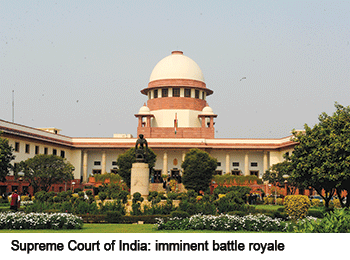 Quite clearly the Supreme Court’s verdict in the appeal of more than 250 private schools of Gujarat against the Gujarat high court’s judgement upholding the Gujarat Self-Financed Schools Act, 2017, and in particular against the ex facie absurd fee ceilings prescribed for private schools under the Act, is of critical importance for the future of private schools in India. Thus far the applicability of the historic T.M.A Pai Foundation and P. A. Inamdar cases which laid down the law for post-higher secondary institutes of professional education, to K-12 schools, has been a grey area. The expectation of private school promoters, managements and principals — although clearly not of the country’s foolish middle class citizenry which expects first world education at third world prices — is that the apex court’s verdict will clear all confusion on this issue. All of them dread the prospect of incremental interaction with the country’s bureaucracy globally infamous for its red tape and venality.
Quite clearly the Supreme Court’s verdict in the appeal of more than 250 private schools of Gujarat against the Gujarat high court’s judgement upholding the Gujarat Self-Financed Schools Act, 2017, and in particular against the ex facie absurd fee ceilings prescribed for private schools under the Act, is of critical importance for the future of private schools in India. Thus far the applicability of the historic T.M.A Pai Foundation and P. A. Inamdar cases which laid down the law for post-higher secondary institutes of professional education, to K-12 schools, has been a grey area. The expectation of private school promoters, managements and principals — although clearly not of the country’s foolish middle class citizenry which expects first world education at third world prices — is that the apex court’s verdict will clear all confusion on this issue. All of them dread the prospect of incremental interaction with the country’s bureaucracy globally infamous for its red tape and venality.
Hearings in the apex court are scheduled to begin on February 1. The Federation of Self-Financed Schools of Gujarat and other appellants have engaged some of the country’s top legal counsel including former attorney general Mukul Rohatgi, senior counsel Shyam Divan, Abhishek Singhvi and former Union human resource development minister Kapil Sibal to argue their case. A battle royale with life or death implications for the future of Indian education is in the offing.